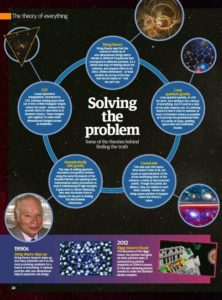Einstein’s Explanation of the Unexplainable
The definition of a Theory of Everything is that it should completely define the physical properties of OUR universe.
Before we begin, we should first determine how we what to do that. In other words, do we want find a universal equation to quantify what we observe or explain why we observe it or BOTH.
For example, quantum mechanics ONLY quantifies observations of environment it defines in terms of the mathematically properties of a wave function. It was developed by using the numerical value of observations to define the wave function that predicts those values
Einstein took a different approach when developing Relativity. First, he sought to understand and explain how and why the speed of light is constant despite the relativemotion of an observer in terms of how things in OUR universe would interact if that were true. He then developed the math to quantify his explanation.
Both of these theories can be part of a theory of everything however that is only possible if they both define the universe we occupy.
For example, one can use mathematics to determine why we observe 4 apples on a table by assuming that originally there were 2 on it and 2 were added or there were 6 and 2 were taken away but only one defines how and why they actually got there.
However, there is no way using math alone to determine how many apples existed before they were observed on the table. Putting it another way one CANNOT use only mathematical solutions confirm the assumption they are based on.
As was mentioned earlier quantum mechanics ONLY quantifies observations of environment it defines in terms of the mathematically properties of a wave function. This means it may define a universe that we do not live even though it can accurately quantify it. This is because, as with the apples a mathematical solution cannot confirm its assumption the wavefunction defines the quantum universe.
However, if one does as Einstein did first try to explain how and why we observed what we do in terms of how things to interact in OUR universe and then derive the math to it one can be sure the solutions it defines are an observable aspect of it.
This suggests if one takes approach the Einstein did in developing Relativity and apply it to the fact that energy is quantized one may be able to derive a Theory of Everything in OUR universe that not only explains why it is but also quantifies it in terms of the interactions of the observable properties of OUR universe.
As was mentioned earlier quantum mechanics developed its mathematical solutions on the assumption the particle properties of energy ARE fundamental. However, before the development of its theoretical structure no one attempted to determine if it was a secondary outcome of an interaction between an observable component of OUR universe.
For example, in “OUR universe” observations, the science of wave mechanics and Relativity tells us an electromagnetic wave moves continuously through space-time unless it is prevented from moving through space by someone or something interacting with it. This would result in it being confined to specific volume of three-dimensional space. The science of wave mechanics also tells us the three-dimensional “walls” of this confinement will result in its energy being reflected back on itself thereby creating a resonant or standing wave in three-dimensional space. This would cause the energy of an electromagnetic wave to be concentrated at the point in space were a particle would be found. Additionally, wave mechanics also tells us the energy of a resonant system such as a standing wave can only take on the discrete or quantized values associated with its fundamental or a harmonic of its fundamental frequency that the wave function associates with a particle. Putting it another way one does not have to assume that the mathematics of quantum mechanics is the only reason why energy in “OUR universe” is observed to be quantized.
This shows even though we cannot observe what goes on in a quantum environment we CAN derive the math we use to describe its properties in terms of observable properties of our universe.
As was just shown there MAY BE solutions to why energy is quantized; other than the one provided for by quantum mechanics which MAY give the same quantifiable results.
However, this suggests we may be able to use the observable properties of our universe to find a Theory of Everything if, we not only attempt to mathematically quantize what we observe but attempt to understand and explain why we observe it based on how its components interact.
For example, as was just shown we can use the observations of how wave energy moves through a macroscopic environment to derive its quantized properties in a microscopic one.
This suggests ONE of the reasons it is so difficult to create a Theory of Everything may be because physicists are focusing too much on mathematically quantifying what we observe and not enough time trying to understand how its components interact to create those observations.